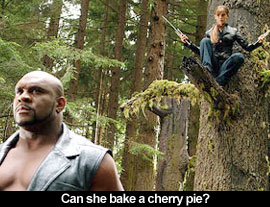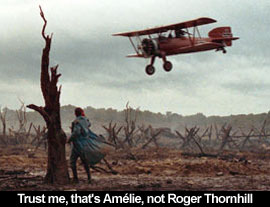Alone in the Dark (2005); Hide and Seek (2005); In the Realms of the Unreal: The Mystery of Henry Darger (2005)
ALONE IN THE DARK
ZERO STARS/****
starring Christian Slater, Tara Reid, Stephen Dorff, Frank C. Turner
screenplay by Elan Mastai, Michael Roesch and Peter Scheerer
directed by Uwe Boll
HIDE AND SEEK
**/****
starring Robert De Niro, Dakota Fanning, Famke Janssen, Elisabeth Shue
screenplay by Ari Schlossberg
directed by John Polson
by Walter Chaw Edward Carnby (Christian Slater) is a "paranormal investigator," which in Uwe Boll's visual vernacular means that he dresses like Highlander Duncan MacLeod and lives in MacLeod's apartment, too. Chip through the film's hard veneer of unsightly stupidity (it looks a lot like a Jess Franco film shot on a smaller budget) and you'll begin to unearth a narrative of sorts concerning an ancient Indian tribe that opened a gateway between the light and dark worlds; most of this is imparted by an interminable opening scrawl that's read aloud because director Uwe Boll, himself illiterate, is sympathetic with his target audience, though we get other clues to a plot from an orphan in flashback who, unlike his twenty peers, escapes possession from, um, some bad thing, and a mad scientist Professor Hudgins (Mathew Walker) and his brilliant (snicker) assistant Aline (Tara Reid) trying to collect a bunch of relics so that they can, what, open the gateway between dark and light? I don't know. Casting Reid as a smart person is, by the way, the biggest miscalculation since casting Denise Richards as a nuclear physicist and Kevin Costner as a doctor, although it is admittedly amusing watching her struggle through phrases like "molecular composition."

 by Walter Chaw
by Walter Chaw by Walter Chaw
by Walter Chaw